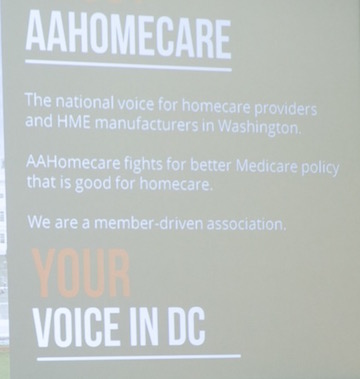WASHINGTON, DC – Last week, CMS announced the determination to classify continuous glucose monitoring (CGM) systems as DME under Part B. CGM is a small device that continuously measures glucose levels. In order for a medical device to be classified as DME under Medicare, the equipment needs to meet the following criteria: function for at least 3 years, can be used repeatedly, primarily has a medical purpose, is used in the home setting, and is only useful for persons with an injury or illness. CGM devices that replace the need for glucometers meet CMS’ DME definition, and there is currently only one product available in the market.
 HHS Publishes Final Rule on Appeals Changes
HHS Publishes Final Rule on Appeals Changes
Last Friday, HHS published the final rule that addresses the appeals backlog titled MEDICARE PROGRAM: CHANGES TO THE MEDICARE CLAIMS AND ENTITLEMENT, MEDICARE ADVANTAGE ORGANIZATION DETERMINATION, AND MEDICARE PRESCRIPTION DRUG COVERAGE DETERMINATION APPEALS PROCEDURES. HHS finalized the proposal that was published last July to establish precedential authority to the fourth level and create attorney adjudicators at the third level of appeals. The final rule did not have drastic modifications to the major provisions in the proposed rule and it will go into effect on March 20, 2017.
You can find the summary to the rule here.
CMS Issues Strategies for Dual Eligibles
WASHINGTON, DC – CMS published guidance to the states on Friday, Jan. 13, in an effort to give strategies to the state to ensure access to DMEPOS is available. This was issued due to comments from 2016 on CMS 1651-P and 2011 comments submitted in response to Federal Register Request for Comment on alignment under Medicaid and Medicare. While CMS cannot enforce these suggestions, we believe that they would benefit both states and providers.
There were 4 strategies issued to states that they could use to ensure appropriate access to DMEPOS:
• Recommend Prior Approval (PA) for dual eligible beneficiaries. Many states do not require PA if Medicare is the primary payer or require a denial from Medicare before they will issue PA. They are recommending that states evaluate the prior approval process for dual eligible beneficiaries for high cost DME and to not require a denial from Medicare for this PA to be issued. They recommend this due to many providers who are unwilling to provide products because they are uncertain if the beneficiary meets Medicare criteria. They recommend PA up front without Medicare denial, but then require providers to obtain a denial on claim submission from Medicare prior to billing Medicaid.
• Ensure DME claims for dual eligible beneficiaries are assessed against Medicaid’s broader coverage criteria. 42 CFR §440.70 language states that Medicaid must cover appropriate medical supplies, equipment, and appliances suitable for use in any setting in which normal life activities take place, other than in patient settings. This went into effect on 7/1/16, but states have up to 2 years to implement this depending on state legislative cycles.
• Ensure Medicaid is only looking for Medicare PA on those items and in those states that Medicare requires it. Gives guidance on new codes for 3/19/2017.
• Guidance that states should consider incorporating these requirements and strategies into contracts with Medicaid MCOs.
HME Audit Key 4th Quarter 2016 Data Submission Round Now Open
WASHINGTON, DC – The new data submission period for the HME Audit Key is now open for data from the 4th Quarter of 2016. Suppliers can go to HMEAuditKey.org to register; participation is free – you just need one of your organization’s NPIs and respective 5-digit zip code to register and get started.
Questions: [email protected]
Phone: 1-844-HME A KEY (844-463-2539)
Reminder: Individual Audit Data is NOT Required: For those of you who have not yet delved into the system, please be assured that the Audit Key does not require you to submit data on individual claims, but instead seeks cumulative counts of pre- and post-payment audits and appeal claim outcomes under DME MAC, RAC and SMRC reviews.
Data Security Assured: Your company’s individual information will never be shared, but will be included in the aggregate data. See additional details on how your data is protected in the Audit Key.
Your participation will help us build a strong data-set of performance benchmarks while also helping the HME community make the case on Capitol Hill and at CMS for much-needed audit reform. If you haven’t yet participated in the Audit Key, please consider joining this data-driven campaign to fix Medicare Audits!


